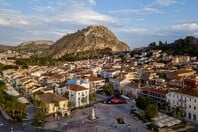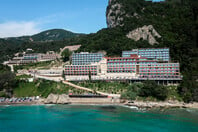...Και το 2011 τα ίδια έλεγε:"Londoners hit back as Cleese says city is 'no longer English"https://www.standard.co.uk/news/londoners-hit-back-as-cleese-says-city-is-no-longer-english-6439482.htmlΠαρεμπιπτόντως:Nevis: how the world’s most secretive offshore haven refuses to clean uphttps://www.theguardian.com/news/2018/jul/12/nevis-how-the-worlds-most-secretive-offshore-haven-refuses-to-clean-up...ε, ναι τώρα:"Nevis would be that island where a British colonialism almost exterminates the original population, then repopulated with enslaved people kidnapped from Africa but which apparently today is culturally fine for a rich white British guy with ‘concerns’ about blighty"+Yes the hypocrisy is quite staggering really when you think about it. I want London to be an English city for English people says @JohnCleese, whilst living in a post colonial town in the Caribbean whose demographic and architecture have been transformed by European immigration."Λεπτομέρειες, καλέ:https://en.m.wikipedia.org/wiki/Kalinago_Genocide_of_1626-------It goes without saying ότι φίλοι, που ζουν και εργάζονται στο Λονδίνο (είτε με ελληνική, είτε με dual υπηκοότητα) ψήφισαν "remain", ενώ φίλη προερχόμενη από κράτος κοινοπολιτείας στον ινδικό ωκεανό, (ινδικής καταγωγής), με τον επί πολλά έτη (λευκό) βρετανό σύντροφό της ψήφισαν "leave"...."Theresa May has faced widespread criticism following comments to the Confederation of British Industry that EU nationals have jumped “the queue” to migrate to the UK ahead of non-EU nationals during the UK’s membership of the bloc. The prime minister said:"It will no longer be the case that EU nationals, regardless of the skills or experience they have to offer, can jump the queue ahead of engineers from Sydney or software developers from Delhi".May has been criticised for ignoring the contribution to the UK of EU nationals, who have been living with great concern about what their futures hold since the 2016 referendum result".+"The Commonwealth argument became particularly interesting when the Leave campaign talked about immigration. Prominent Leave campaigners such as Michael Gove often claimed that the EU was essentially forcing Britain to implement a “racist” immigration system. While predominantly white EU migrants were allowed to freely enter the UK, those from the Indian subcontinent were subject to visa and work restrictions. Voting Brexit was seen as an opportunity to “level out” this in-built unfairness."+Παρ' ολ' αυτά:"White British were the most pro-Leave, followed by those of Indian background who were almost twice as likely to support Leave as other minority groups. There were much higher levels of support for Remain amongst Pakistanis, Bangladeshis, Black Caribbean and Black African groups – on average a quarter being more pro-Leave than Remain".+Ενδιαφέρουσες αναλύσεις:"Local voting figures shed new light on EU referendum"The data confirms previous indications that local results were strongly associated with the educational attainment of voters - populations with lower qualifications were significantly more likely to vote Leave. (The data for this analysis comes from one in nine wards)The level of education had a higher correlation with the voting pattern than any other major demographic measure from the censusThe age of voters was also important, with older electorates more likely to choose LeaveEthnicity was crucial in some places, with ethnic minority areas generally more likely to back Remain. However this varied, and in parts of London some Asian populations were more likely to support LeaveThe combination of education, age and ethnicity accounts for the large majority of the variation in votes between different placesAcross the country and in many council districts we can point out stark contrasts between localities which most favoured Leave or RemainThere was a broad pattern in several urban areas of deprived, predominantly white, housing estates towards the urban periphery voting Leave, while inner cities with high numbers of ethnic minorities and/or students voted RemainAround 270 locations can be identified where the local outcome was in the opposite direction to the broader official counting area, including parts of Scotland which backed Leave and a Cornwall constituency which voted Remainhttps://www.bbc.com/news/uk-politics-38762034Και:"Minority ethnic attitudes and the 2016 EU referendum""BAME Remainer motivationsThe motivations of those ethnic minority voters who backed Remain were broadly in line with the population as a whole. Support for Remain was strongest amongst younger ethnic minority voters with degrees and in more professional occupations; Remainers also tended to be female and British-born. Though some were ambivalent towards the EU, ethnic minority Remain voters were more likely to be positive about Britain being part of the EU, and to have had more positive contact with EU migrants.They also placed greater emphasis on rights and environmental regulation than did Leave voters, and less on national identity and sovereignty, associating post-war peace in Europe with the EU as an institution. Ethnic minority Remain voters were also more likely to be pro-immigration, and in favour of freedom of movement.One factor that differentiated ethnic minority Remain voters from their white equivalents was the strength of their reaction to what they saw as the xenophobic and anti-immigrant tone of the Leave campaigns. In this sense, a Remain vote was more a vote against Leave than an endorsement of the EU. Many saw the referendum as unleashing a backlash against diversity that was directed against non-whites."vs"BAME BrexiteersAlthough fewer BAME people voted Leave, among this group the referendum acted as an outlet for strongly-held grievances. These voters felt Britain was being controlled by the EU.In particular, they were concerned about the EU overriding UK law and imposing ‘unnecessary’ red tape, while free movement was thought to undermine the UK’s ability to govern its borders.Ethnic minority Leave voters were more likely to be male, older, and foreign born. They were also less likely to have taken advantage of the ability to travel to, live or work in EU countries.Some ethnic minority Leavers felt other member states were more racist or Islamophobic, and that minority rights were better protected in Britain. Some female Muslim Leave voters more concerned by the hijab and burkini bans put in place in some member states than they were reassured by EU attempts to promote gender equality.The ethnic minority Leave participants in this study raised concerns about immigration, particularly Eastern European, which they felt increased pressures on public services and strained community relations. There was also resentment concerning the apparent ease with which European migrants could enter the UK, but also get work and access benefits.For some, this stood in stark contrast to the situation of immigrants from the Commonwealth, not least when it came to the right to bring spouses or staff from non-EU countries. As such, the referendum revealed tensions between longer-settled BAME groups and newer Eastern European arrivals.Europe was conceived of by some as a ‘white Fortress’, permitting white immigration while obstructing the entry of non-whites. Some respondents saw evidence of this in the EU’s response to the refugee crisis.There was also criticism of specific EU policies such as the Common Agricultural Policy, which were seen as disadvantaging developing countries in Africa and Asia. Leaving the EU, it was felt, would increase trade and migration between the UK and the Commonwealth."https://ukandeu.ac.uk/minority-ethnic-attitudes-and-the-2016-eu-referendum/--------Να σημειωθεί ότι:In the year ending June 2018:• 6.2 million people were living in the UK who had the nationality of a different country (9% of the total population, χώρις να υπολογίζει αυτούς που έχουν διπλή υπηκοότητα).Εκ των οποίων:• 3.7 million EU nationals were living in the UK....Να σημειωθεί, επίσης, ότι το 2011 ο πληθυσμός του Λονδίνου ήταν 8,173,941, ενώ το 2001 ήταν 7,172,091. Η αύξηση των λευκών (other, non british) ήταν γύρω στις 500.000 ενώ οι white brits συρικνώθηκαν κατά 600.000. "Why have the white British left London?"(...)The years between the last two censuses (2001 και 2011) have witnessed significant cultural change in London, particularly in the outer boroughs. Some white British may have moved because their neighbourhood has been culturally transformed, the tea rooms and restaurants replaced by takeaway chicken shops and halal supermarkets serving the new arrivals.But there is also a story here of white working class families that escaped from the slums and bombed-out East End in the middle of the last century, found new opportunities in London's outer boroughs and then, in the past decade - often having prospered from the housing boom and the capital's economic growth - cashed in their assets and bought themselves that little cottage in the countryside or by the sea.https://www.bbc.com/news/uk-21511904























